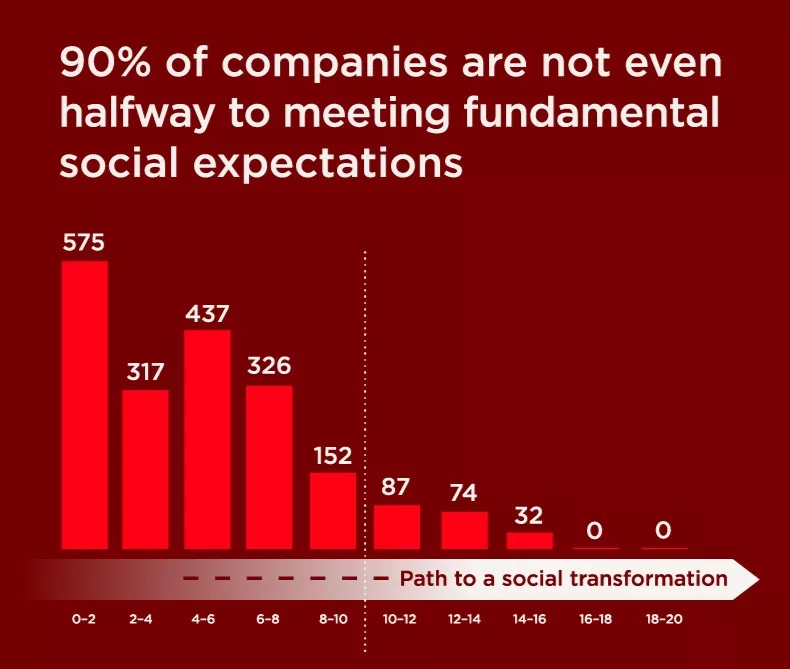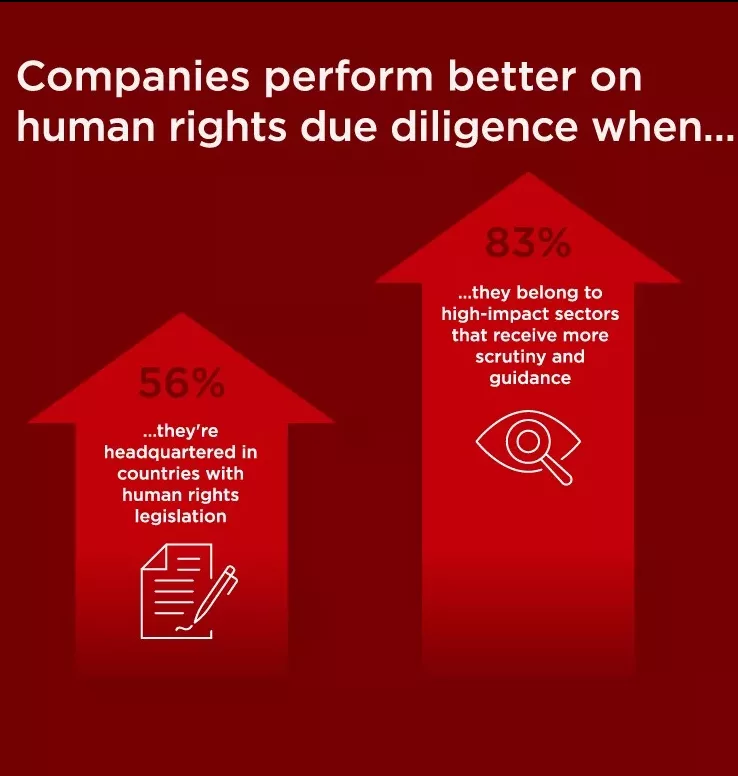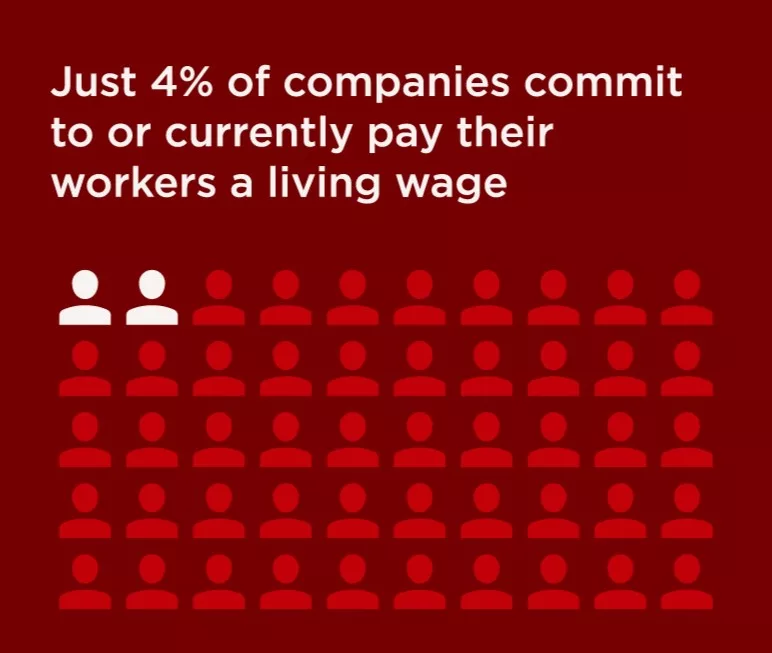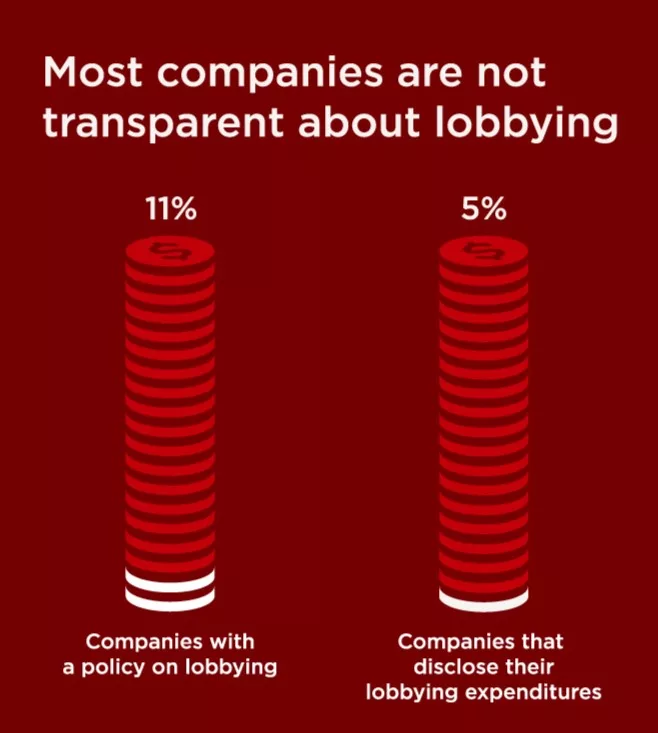At a time when many people are experiencing a cost-of-living crisis as well as system-level inequalities, the World Benchmarking Alliance’s (WBA) 2024 Social Benchmark finds that the 2,000 most influential companies are failing to fulfill societal expectations to foster a more equal and inclusive world.
The Social Benchmark
The World Benchmarking Alliance’s Social Benchmark evaluates company performance against high-level expectations related to driving systemic change. This includes respecting human rights, providing decent work with a living wage, and acting ethically by paying their fair share of taxes and lobbying responsibly. WBA assessed 2,000 of the world’s most influential companies across 19 industries which collectively generate revenue equal to 45% of global GDP. These companies directly employ 95 million people and impact hundreds of millions more through their value chains. As such, they have the capacity and the responsibility to provide genuine leadership. However, the results are concerning – 90% of the assessed companies are not even halfway toward meeting basic societal expectations on human rights, decent work and ethical conduct.

Respecting human rights
Among the top 10% of companies that surpass the halfway mark, a strong commitment to respecting human rights is evident, highlighting the importance of understanding company impact on people for socially responsible business practices. Despite this, only 9% provide examples of how they engage with stakeholders affected by their operations. Companies that do engage with affected stakeholders perform better across all benchmark indicators, particularly in commitments to respecting human rights and implementing human rights due diligence. Those companies consulting affected stakeholders are more likely to provide decent work, especially by respecting worker health and safety and promoting gender equality and women’s empowerment.
Human rights due diligence
Understanding the risks faced by affected stakeholders is essential for companies to effectively translate their responsibility to respect human rights into action. However, 80% of companies score zero on the initial steps of human rights due diligence, which include identifying, assessing, and taking action on human rights risks and impact. Companies based in countries with strong human rights regulations score nearly 60% higher on average and those in high-impact sectors score over 80% higher. A combination of regulatory frameworks, voluntary guidance and collective stakeholder efforts is essential for driving improved human rights due diligence practices and minimising potential negative impact on people. As policy actions on human rights due diligence become more prevalent, it is crucial they are harmonised across jurisdictions, ensure accountability mechanisms and strengthen sectoral guidance and stakeholder initiatives.
Providing and promoting decent work
Most companies in the benchmark perform poorly on fundamental aspects of decent work – particularly in areas like living wages and working hours. Only 4% of the 2,000 companies pay their direct employees a living wage, and less than 1% of the remainder have set a target to do so. Only 3% of companies support the payment of a living wage in their supply chain, and just 3% of companies meet the International Labour Organization’s (ILO) minimum standards on working hours. By committing to paying a living wage, and supporting their suppliers to do the same, companies can play their part in addressing economic inequality and help bring millions of workers and their communities out of poverty.
Acting ethically
The 2,000 most influential companies, which generate revenue amounting to almost half of global GDP, lack transparency in their political engagement strategies and spending. This lack of openness can lead to potential misalignment between companies’ political activities and their commitments to human rights and decent work, as well as with broader expectations of responsible business conduct. Only 11% of companies have a public policy outlining their approach to lobbying and political engagement, and just 5% disclose their lobbying expenditures.
Sectoral and regional trends
Given the diversity of these 2,000 companies, the Social Benchmark also explores sectoral and regional trends. Consumer-facing companies, such as those in the apparel and footwear, ICT and retail sectors, perform better than other sectors where the costs of failing to meet stakeholder expectations may not be felt as strongly. Companies in these sectors are more likely to face public scrutiny regarding their human rights practices, especially from consumers who are vigilant about human rights abuses within the supply chain. Regionally, all areas except Central Asia are represented in the top-scoring 10% of companies, showing that good practices are found across the globe. However, average performance varies widely among regions, from 35% among companies based in the Pacific to an 11% average for companies headquartered in the Middle East and North Africa. Additionally, when examining intergovernmental forums, we found that companies based in the European Union (EU) and the Organisation for Economic Cooperation and Development (OECD) perform better than the overall benchmark average, while companies based in countries that comprise the Group of Twenty (G20) perform slightly below the overall average. To address the fundamental systemic issues preventing social transformation, we need multi-regional and global collaboration. These forums allow for global dialogue between diverse stakeholders to address the significant gap between current corporate practices and societal expectations.
This Social Benchmark underscores the significant gap between current corporate practices and societal expectations for building a more equitable, inclusive and just world. While a small number of companies show that good performance is possible in all areas of human rights, decent work and ethical conduct, the majority of companies fall short. Without substantial improvements in corporate conduct, achieving the Sustainable Development Goals will remain elusive.
See how each company scored, and read the WBA’s insights report for more detailed analysis of our findings. The report also lays out WBA’s next steps to advance socially responsible business conduct and help close the corporate accountability gap.
